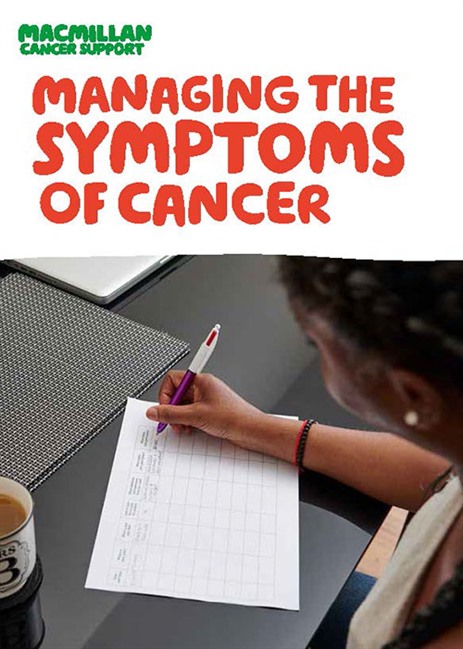
Symptoms caused by a health condition like cancer may affect your physical or mental well-being. These symptoms can include pain, sleeplessness, eating problems or fatigue. Cancer doesn’t always cause symptoms, of course, but for some people, it can. In this post, our cancer information nurse, Teresa Gonzales, walks us through some of the more general cancer symptoms and how to manage them.
Symptoms depend on your cancer type and can happen at any stage. They usually improve with cancer treatment, but some people may have ongoing symptoms or develop symptoms at a later stage. This may happen when the cancer has spread (advanced).
There are many ways to manage symptoms, so it is important to tell your doctor or nurse about any symptoms you have. They can assess you to find the best way to manage them, which might include using certain medicines or other treatments.
This blog looks at some of the symptoms you may have if you have cancer and suggests ways to help manage them.
Tiredness (fatigue)
Fatigue means feeling very tired or exhausted all or most of the time. It is a common symptom for people with cancer. It can be due to the cancer or its treatment, although other symptoms can also cause tiredness, including pain, shortness of breath, or a low red blood cell count (anaemia).
What can help?
We have more information about managing tiredness and also complementary therapies.
Difficulty sleeping
If you have difficulty sleeping (insomnia), it can be very frustrating and worsen other symptoms. There are some things your treatment team may be able to suggest trying to improve your sleep. It can sometimes help to take a short course of sleeping tablets to help you get into a better sleep pattern. But there are other things you can try to help you to get a better night’s sleep.
We have more information on ways to manage insomnia.
Managing Pain
 Pain can happen for different reasons. The cancer doctor or GP can assess the possible cause of the pain. This will help them know the best way to manage the pain. Different types of painkillers can be used to treat different types of pain. Some people find that non-drug treatments or complementary therapies can also help relieve pain and make coping easier. You may have a Macmillan or palliative care nurse who can provide emotional and practical support and help you to cope with pain.
Pain can happen for different reasons. The cancer doctor or GP can assess the possible cause of the pain. This will help them know the best way to manage the pain. Different types of painkillers can be used to treat different types of pain. Some people find that non-drug treatments or complementary therapies can also help relieve pain and make coping easier. You may have a Macmillan or palliative care nurse who can provide emotional and practical support and help you to cope with pain.
We have more information on ways to manage pain. You may also find our audiobook on managing pain of interest.
Coping with eating problems
Many people find their treatment for cancer, or the cancer itself, can cause problems with eating, including sickness, appetite loss and a sore mouth. There are many ways the doctor or nurse can help you with these symptoms. They can help find ways to increase your food intake, which can also help your energy levels, and if necessary, can refer you to a dietician.
We have more information on managing eating problems.
Controlling nausea and vomiting
There can be many different reasons for nausea. Your doctor will first find out the possible cause, which will help them to know how best to manage the nausea. There are different anti-sickness drugs that can be used. If you are unable to swallow a tablet, there are other ways you can have the drug. Relaxation exercises or taking part in activities that you find relaxing may also help you cope with nausea.
We have more information on ways to cope with nausea and vomiting.
Bladder and bowel problems
Bladder problems include needing to pass urine (pee) more often than usual, having pain when you pass urine, or having problems controlling your bladder. Bowel problems include having diarrhoea or constipation. Some types of cancer treatments can also cause bladder and bowel side effects.
We have more information about how to help manage bladder and bowel problems.
Breathlessness
Breathlessness and coughing can be a symptom of primary lung cancer or secondary lung cancer. Although, there can be other causes. The way breathlessness is managed will depend on the cause. Sometimes cancer treatments may be used.
helpful. You can order a free CD or listen online.
All these symptoms and others are covered in more detail in our booklet ‘Managing symptoms of cancer’.
Some symptoms may be caused by treatments for cancer. We have separate information about side effects in our information side effects of cancer treatment.
You can also call our Macmillan Support Line on 0808 808 00 00. They are open every day, 8am - 8pm and offer confidential support to people living with cancer and their loved ones.
Whatever cancer throws your way, we’re right there with you.
We’re here to provide physical, financial and emotional support.
© Macmillan Cancer Support 2026 © Macmillan Cancer Support, registered charity in England and Wales (261017), Scotland (SC039907) and the Isle of Man (604). Also operating in Northern Ireland. A company limited by guarantee, registered in England and Wales company number 2400969. Isle of Man company number 4694F. Registered office: 3rd Floor, Bronze Building, The Forge, 105 Sumner Street, London, SE1 9HZ. VAT no: 668265007